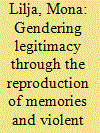|
|
|
Sort Order |
|
|
|
Items / Page
|
|
|
|
|
|
|
| Srl | Item |
| 1 |
ID:
082253


|
|
|
|
|
| Publication |
2008.
|
| Summary/Abstract |
This article argues that the legitimacy of both male and female politicians in Cambodia is partly built on discourses of violence and reconstructed memories of the past. From this standpoint, this article looks at how women's and men's relation to violence-and memories of violence-creates and undermines their legitimacy as political leaders. Additionally, it relates how women use memories of violence in their strategies to increase their political authority. Based on interviews with fifty-two female and male politicians and nongovernmental workers in Cambodia, this article addresses how discourses on politics rely on notions of "then" and "now" of violence and the images of identity emerging from these
|
|
|
|
|
|
|
|
|
|
|
|
|
|
|
|
| 2 |
ID:
183706


|
|
|
|
|
| Summary/Abstract |
This article aims to specifically contribute to debates concerning dissent within the scholarship of International Relations (IR), through elaborating the constructive qualities of resistance. Composite and fruitful stories concerning resistance against power have flourished in studies of the ‘global’. Still, there has been a trend in IR to embrace resistance as a sense of opposition and it has been primarily described in terms of, ‘“counter”, “contradict”, “social change”, “reject”, “challenge”, ‘opposition”, “subversive”, and “damage and/or disrupt”’.1 This article adds to the literature on resistance's productive dimensions by drawing upon the case of the #MeToo campaign in Japan. The #MeToo movement in Japan should not only be viewed as a ‘non-cooperative’ form of resistance – that is, resistance that breaks norms, rules, laws, regulations and order, typically in public and in confrontative ways; rather, the #MeToo movement should be regarded as a ‘constructive’ form of resistance, which produced new resistance figures, movements, narratives as well as established new expressions of resistance. It may be perceived as a contagious form of resistance, which operated through reiterations, doublings, and re-experiences. The campaign provides a significant example of how discourses move transnationally through the force of repetition.
|
|
|
|
|
|
|
|
|
|
|
|
|
|
|
|
|
|
|
|
|